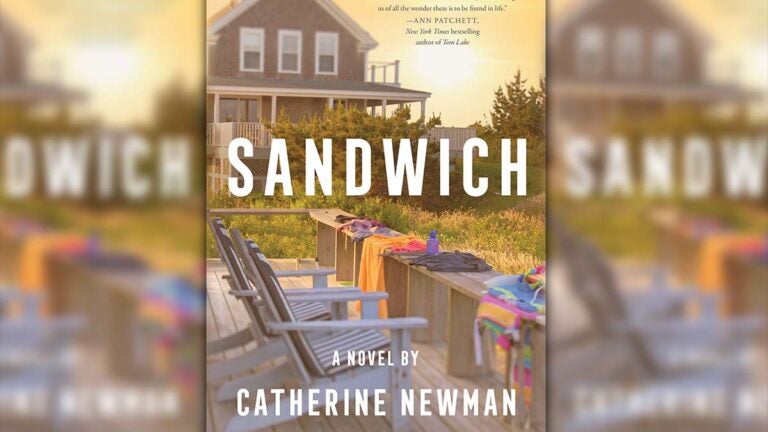Books
Catherine Newman is fearless in her depiction of the physical and emotional indignities of getting older.

“Sandwich”
By Catherine Newman
Harper. 240 pp. $26.99
– – –
The sandwich Catherine Newman serves up in her new novel, “Sandwich,” is a classic one: grown kids on one side, aging parents on the other, and 54-year-old narrator Rachel, a.k.a. “Rocky,” in the middle. As they do every year, three generations of Rocky’s family have decamped to Cape Cod for a week, a gathering made all the more special since son, Jamie, and daughter, Willa, no longer live at home, and their grandparents are becoming quite frail.
Newman’s last novel, the very moving “We All Want Impossible Things,” was a paean to friendship. Her new book practically glows with family feeling – “I’m drowning in love,” says Rocky at one point. “Sandwich” has much in common with Ann Patchett’s “Tom Lake,” though Patchett’s novel doesn’t have an older generation, a key element here.
The laughter begins on the first page, where we learn that Rocky is “long married to a beautiful man who understands between twenty and sixty-five percent of everything she says” – and the great lines and witty observations never stop. Many of them arise from the indignities of aging and menopause, which has left no part of Rocky’s physical and emotional being untouched.
“My hair! What on earth? It used to hang down in heavy, glossy waves, and now it sticks out of my head like a marshful of brittle autumn grasses. It is simultaneously coarse and weightless in a way that seems like an actual paradox, as if my scalp is extruding a combination of twine, nothing, and fine-grit sandpaper.”
Newman is fearless in her depiction of the physical and emotional indignities of getting older. Rocky’s fits of irrational rage often manifest in her relationship with her calm and kind husband, Nick. A typical moment occurs when the couple is in line at the bakery and Rocky gets mad at Nicky because he doesn’t know which pastry Rocky would choose. When she insists that in nearly 30 years she has never once chosen sweets for breakfast, he reminds her about the almond croissants she ordered in Paris. She grudgingly concedes his point but remains angry. The poor man realizes there is no course but apology. “I’m sorry I don’t know you better. In the bakery sense.”
As it turns out, there is more than baked goods involved, though it’s Rocky’s fault for having kept an important secret for many years. The week in Cape Cod probably wasn’t going to be all sunshine and rainbows, but Rocky’s miserable perseverating over something in her distant reproductive past feels a little out of place. Perhaps this is also occasioned by menopause, representing as it does the close of a chapter of life, but to this reader the whole thing felt a bit cooked-up.
The other stone in the shoe of the gentle plot is concern for the health of Rocky’s parents, which makes more sense. The depiction of Mort and Alice, their dialogue, their posture, their sleeping white heads on the pillow, their humor, are endearing. When Mom has a fainting spell at the beach and ends up briefly in the hospital, Rocky wonders if they’ll stay an extra day. “But my parents have a strict two-night policy. If they traveled sixty million miles to visit you on Mars, they’d bring Zabar’s whitefish salad in a cooler bag and they’d stay two nights.”
The abundance of love flourishing in Rocky’s family is refreshing and inspiring, but Newman is not afraid to go to the dark side of it. There was a time, Rocky recalls, when her children were small and she was half-mad with exhaustion and anxiety, and she ruminated on storiesabout women driving themselves and their children off cliffs or into oncoming traffic. “I thought, ruinedly, Yeah. I get that.” She wouldn’t have done it, she says, but understood why someone might. And then she continues, “I hope I wouldn’t have. I’m honestly not entirely sure.”
I imagine some readers will feel a little shock of gratitude upon reading this passage and even more will embrace Rocky’s view of the meaning of life. At one point, she and Willa are in the laundromat when a child begins to cry because her beloved (smelly) snail shell has been taken away. After Willa calms her down, expressing empathy about having to abandon the dubious treasure, Rocky suggests this takeaway:
“And this may be the only reason we were put on this earth. To say to each other I know how you feel. To say, Same. To say, I understand how hard it is to be a parent, a kid. To say, Your shell stank and you’re sad. I’ve been there.”
Marion Winik, host of the NPR podcast “The Weekly Reader,” is the author of numerous books, including “First Comes Love” and “The Big Book of the Dead.”
📚 Stay up-to-date on the Book Club
Catch up on the latest Boston.com Book Club pick and join the virtual author discussions.
